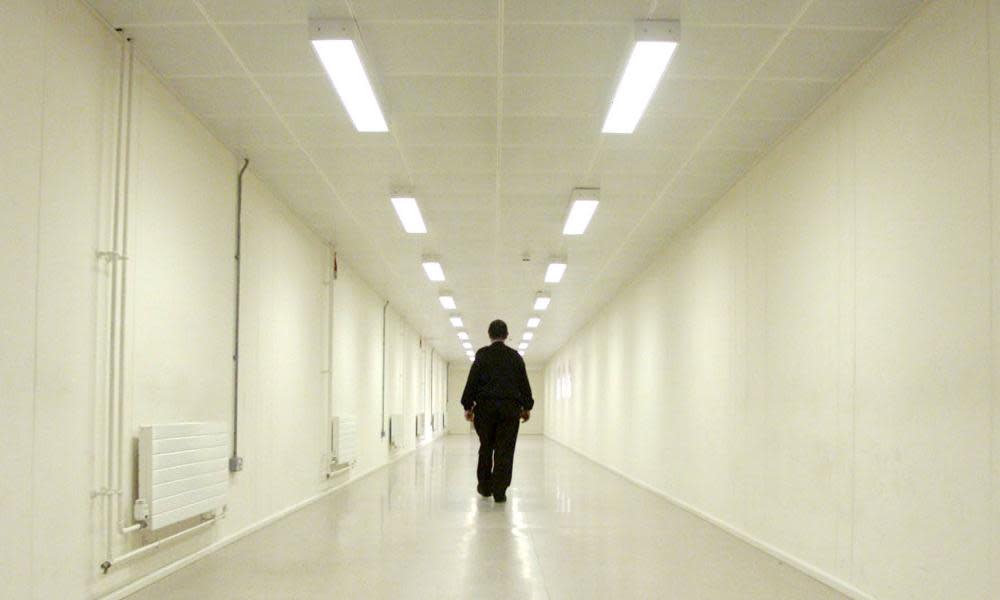Immigration detainees bring legal challenge against £1 an hour 'slave' wages

Ten people detained in UK immigration centres have launched a legal challenge against the Home Office for paying them “slave labour” wages of £1 per hour.
The detainees, from countries including Nigeria, Jamaica and Poland, are not covered by minimum wage legislation even though, unlike prisoners, they have committed no crime.
The Home Office says the menial work is provided on a voluntary basis to meet their “recreational and intellectual” needs and provide “relief from boredom”.
Lawyers for the detainees have lodged initial legal proceedings known as a pre-action protocol. The Home Office, pointing out that the work is optional, has rejected the points raised but said it would review the rates of pay.
Any change would be a significant departure from the existing Home Office position. An internal document on pay rates seen by the Guardian said £1 an hour “seems high” and ministers agreed to pay it “reluctantly”.
The work carried out by detainees includes kitchen tasks, cleaning toilets and showers, and litter picking. They are paid £1 per hour, though for some projects this rises to £1.25 per hour.
Prisoners are paid around 20p per hour for work done as part of their rehabilitation.
One of the detainees said the work was “like slave labour”. However, the Home Office does not force anyone to do the work, and immigration detainees do not have to pay for any meals or accommodation.
But while the Home Office claims the work is intended to provide recreational relief for detainees, those behind the legal challenge say they need the money to buy essentials.
“Detainees get an allowance in detention of 71p per day – £5 per week,” one said. “That is not enough to purchase basic things we need from the detention centre shop. And the quality of the food is so bad it is sometimes inedible. So I need money to buy basic food from the shop.
“I work to survive in detention. In my home country I was a student and didn’t do things like cleaning toilets but in detention I said I would work because I felt I didn’t have a choice.”
The Guardian has seen a redacted detention services order (DSO), providing guidance on work in immigration detention centres, that reveals the Home Office’s reluctance to pay even £1 an hour – less than a seventh of the current minimum wage of £7.50 per hour for workers over 25.
The Home Office standardised work payments in 2008, which had previously varied from centre to centre.
The DSO, written by a Home Office official, said: “Whilst £1 per hour seems high I am reluctantly recommending that we accept this as the basic pay rate. The official said reducing the rate to the preferred level of 75p would be “too risky”, warning that: “We would be heavily criticised by the likes of NGOs, IMBs (independent monitoring boards) and HMIP [the prisons inspectorate].”
Stephen Shaw, a former prisons ombudsman who conducted a review of the welfare of vulnerable people in detention for the Home Office in January 2016, recommended that wage rates should be reviewed and advocated greater flexibility of payments.
The lawyers acting for the detainees have called on the Home Office to introduce pay flexibility and a procedure for detainees to apply for a pay rise. They say the basic pay should be set at a higher rate than £1.
Toufique Hossain, director of public law and immigration at Duncan Lewis solicitors, which is bringing the action on behalf of the 10 detainees, said: “We have put the Home Office on notice that their policy in relation to paid work in removal centres is unlawful.
“That the Home Office are imposing £1 an hour as a maximum wage, that cannot be increased irrespective of worker performance, and for work that is essential to the day-to-day running of these centres, is yet another repugnant feature of immigration detention and it needs to be changed with immediate effect.
“The Home Office has said they are considering a review of this policy. If they do not make changes urgently, we will issue proceedings in the high court.”
In 2014 the pressure group Corporate Watch submitted freedom of information requests to the Home Office about pay rates in immigration detention centres. It found that in May of that year hundreds of detainees had been paid £45,438 for 44,832 hours work.
The Home Office declined to comment because legal proceedings were ongoing.

 Yahoo News
Yahoo News 
